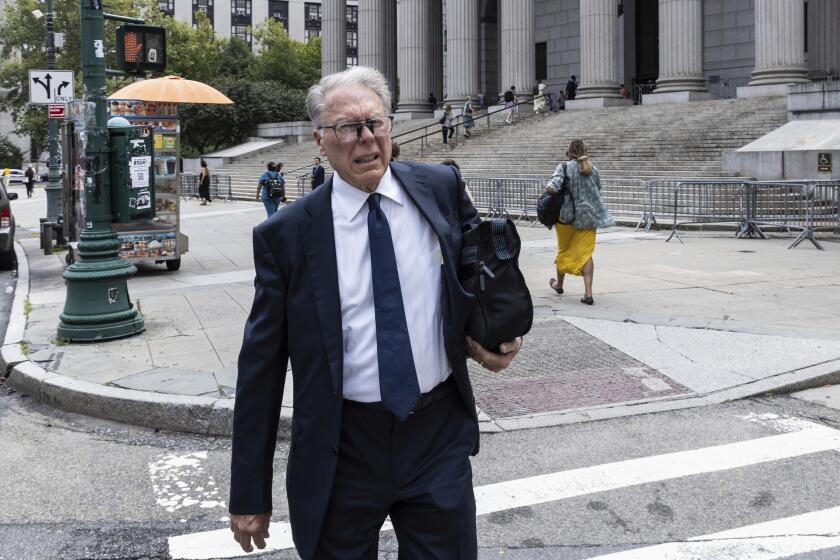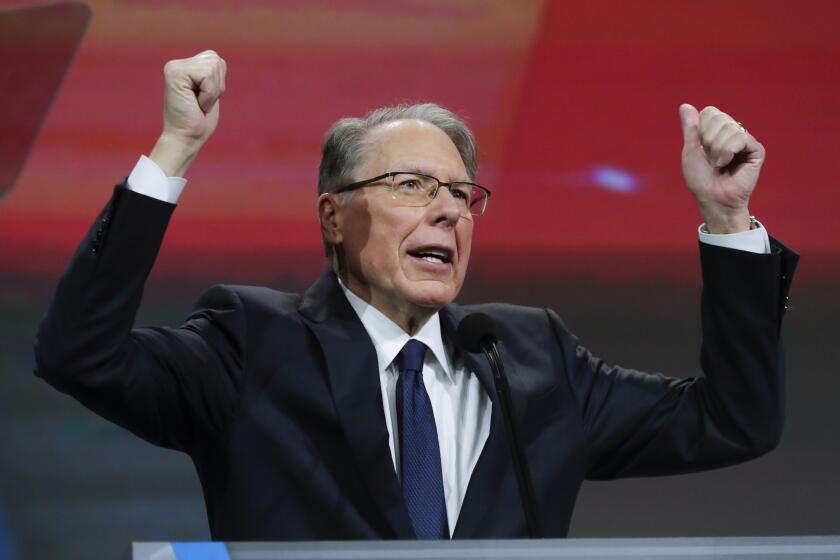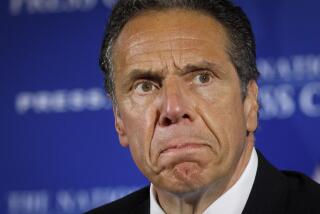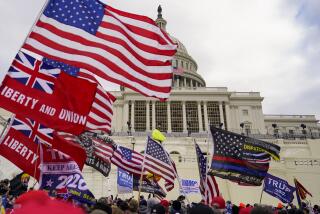Judge declines to appoint monitor for NRA but hands former CEO Wayne LaPierre a 10-year ban
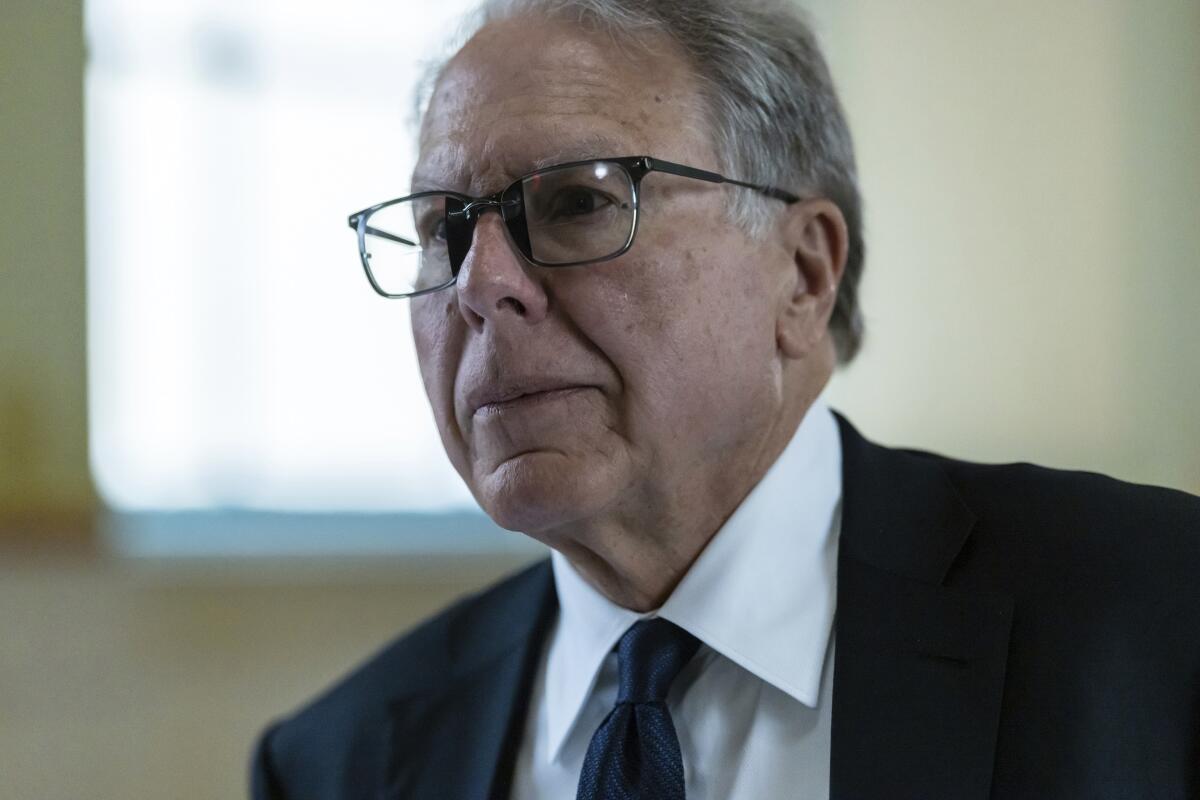
- Share via
NEW YORK — A New York judge on Monday banned Wayne LaPierre, the former head of the National Rifle Association, from holding a paid position with the organization for a decade, but he declined to appoint an independent monitor to oversee the gun rights group’s finances.
The split decision from Judge Joel Cohen came on the final day of arguments in the second stage of the civil trial of the NRA brought by New York Atty. Gen. Letitia James.
Ruling from the bench, Cohen said the state’s request for a monitor was not the correct remedy, suggesting the outside oversight mechanism would be “time-consuming, disruptive and will impose significant costs on the NRA without corresponding benefits.”
Cohen also said he had concerns about “speech-chilling government intrusion on the affairs of the organization.”
He said the same First Amendment concerns did not apply to whether LaPierre could serve anytime soon in the organization.
“This relief is about the privilege, not the right, to serve as an officer or director of a New York not-for-profit,” he said.
The second phase of the civil trial of the National Rifle Assn. and its top executives over their spending begins in New York.
Earlier Monday, LaPierre told the judge that appointing a monitor to oversee the gun rights group’s finances would be “equivalent to putting a knife straight through the heart of the organization and twisting it.”
He described the appointment of a monitor as an existential threat to the group because it would send a message to prospective members and donors that the NRA was “being surveilled by this attorney general in New York.”
If the monitor is appointed, he said, “James will have achieved her objective to fulfill that campaign promise of, in effect, dissolving the NRA for a lack of money and a lack of members.”
Following the trial’s first phase earlier this year, a jury found LaPierre and another deputy liable for misspending millions of dollars on personal expenses. James was seeking an independent monitor to oversee the group’s finances and compliance with whistleblower policies. She was also seeking to bar LaPierre, the organization’s mouthpiece for decades, from returning to the NRA.
It’s unclear what effect, if any, the 10-year ban on LaPierre serving with the NRA might have.
The National Rifle Assn. has been beset by dwindling membership and financial troubles, and questions about Wayne LaPierre’s leadership and spending.
In her closing statements, NRA attorney Sarah Rogers said the group had no plans to rehire LaPierre, even as she described him as a “visionary leader who commanded a lot of respect and deference.”
She said the group has implemented strong internal controls that made the appointment of a monitor unnecessary.
LaPierre served as the group’s chief executive and executive vice president for more than three decades. He resigned in January on the eve of the first phase of the trial.
Those proceedings cast a spotlight on the leadership, culture and financing of the organization, with state lawyers accusing LaPierre of siphoning millions of dollars from the organization to fund his lavish lifestyle, including trips on private jets and other personal gifts.
The jury ordered LaPierre to repay almost $4.4 million to the organization, while the NRA’s retired finance chief Wilson “Woody” Phillips was ordered to pay back $2 million.
In the aftermath of massacres in Texas and Ohio, the gun control debate has returned to the National Rifle Assn. and its power to stymie legislation on the issue.
The second phase of the proceeding was a bench trial, meaning there was no jury and the judge handed down the verdict.
Earlier this month, Jeffrey Tenenbaum, a lawyer testifying for the state as an expert in nonprofit law, said the NRA had made some strides toward transparency but could backslide without the appointment of an independent monitor. He described the organization’s policy manual as “a dumpster fire.”
State attorneys noted that LaPierre hadn’t been reprimanded by the organization. Although the NRA has touted a change a leadership, several LaPierre loyalists remain in its upper echelons. The NRA has lost more than 1.3 million members since 2018, according to an expert witness called by the group.
James sued the NRA and its executives in 2020 under her authority to investigate not-for-profits registered in the state. She originally sought to have the entire organization dissolved, but the judge ruled in 2022 that the allegations did not warrant a “corporate death penalty.”
Offenhartz writes for the Associated Press.
More to Read
Sign up for Essential California
The most important California stories and recommendations in your inbox every morning.
You may occasionally receive promotional content from the Los Angeles Times.
